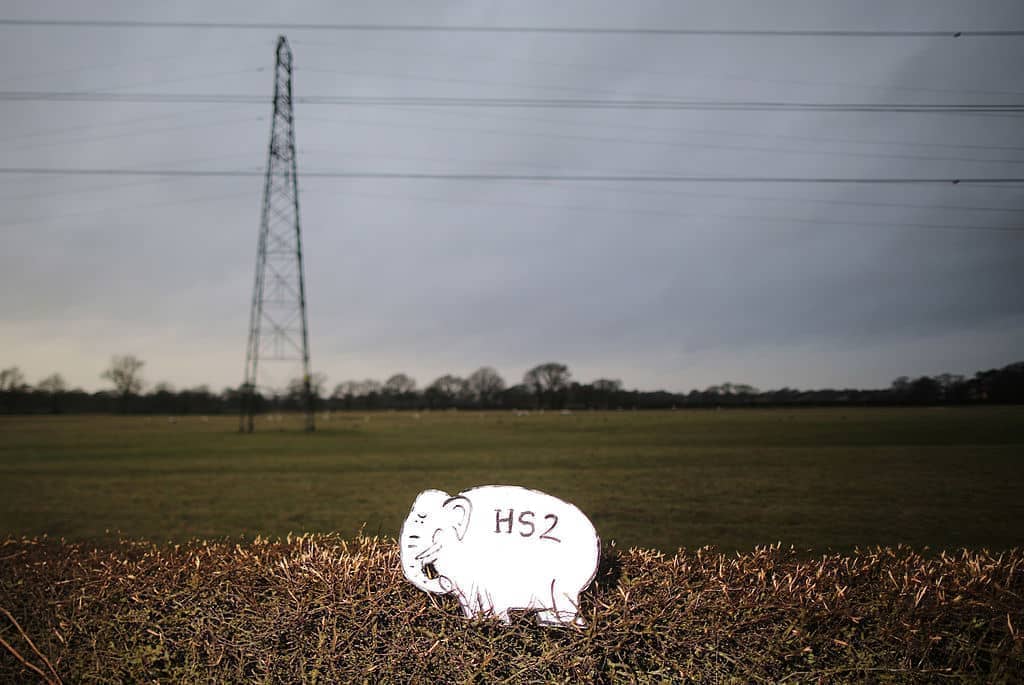There are government projects gone haywire – and then there’s HS2. The High Speed rail project should never have been given the nod in the first place. Costs spiralled out of control from the very beginning: it was estimated to cost £32.7 billion in 2012, now this is set to surpass £100 billion. The technology will be out of date before it even comes online. The government is right to ditch plans for an easterly arm of HS2 from Leeds to Birmingham. In contrast to the London to Birmingham section, no buildings have yet been flattened, no earth has been moved. Now is the chance to abandon it, before any more money and effort is spent.
But even with billions funnelled into the first leg of the journey, there’s still a strong case for scrapping the rail project completely. It is a scandal that successive governments have pressed ahead with the project, and even more scandalous that every leader has bought into the ‘sunk cost fallacy’, allowing wasted taxpayer money to justify wasting billions more.
The economic case – which was always weak – was further undermined by rising costs and the revelation that it was based on an assumption that passengers cannot work on trains; that every minute spent travelling is a wasted minute. Yet rather than order HS2 Ltd, the company set up to deliver the project, to get a grip on costs, prime ministers have bitten their tongues and waved the extravagance through.
Better still, take devolution policy a step further and empower more regions to offer lower taxes and business rates
By dropping the eastern arm of HS2 the government is not abandoning the ‘Red Wall’ seats which Boris Johnson won in the 2019 general election. HS2 never was meant as a regeneration project. On the contrary, the rail project was designed to link only relatively well-off places: the centres of Manchester, Leeds and Birmingham. As for the secondary towns and cities – the likes of Coventry, Bradford, Rochdale – HS2 passes them by or never quite reaches them.
Nottingham and Derby were offered a tram line to link them to an HS2 station. But the real ‘Red Wall’ lies further still from the glass palazzos of HS2 termini. It consists of the former industrial areas of West Cumbria, County Durham, Humberside – where greater connectivity to London is the last thing on anyone’s mind. What is most needed in these areas are industrial jobs – for which connectivity via road and rail freight is a far more important issue.
HS2 sums up the patronising attitude towards what ministers like to call ‘the North’. Far from ‘levelling up’, it almost seems to have been dreamt up to allow London-bound ministers to spend even less time in the regions. Instead of a gruelling day out in a distant constituency, it promises them swift outward and return journeys so they can be back at Westminster for dinner or an evening vote.
If greater rail capacity is the issue it can be provided at far less cost with more modest upgrades. The high line speed of HS2, 225 mph, appears to have been inspired more by a desire to be able to boast of having the fastest railway in Europe, rather than by Britain’s compact geography. So far it looks most likely to succeed in pushing up the price and making it impractical to include more than a handful of stations in the upgrades.
If there is an existing government policy which has the power to regenerate former industrial areas, it’s freeports. Better still, take devolution policy a step further and empower more regions to offer lower taxes and business rates. Focus on jobs, too. The government has all but squashed fracking, which could have brought new wealth to Lancashire, and the Prime Minister has registered his opposition to a new mine in Cumbria which could supply coking coal to the flagging UK steel industry. But where are all the ‘green jobs’ which are supposed to replace the dirty industrial jobs?
It is depressing that for all the government’s talk about its energy and environmental policies stimulating a new industrial revolution, so many of the wind turbines, solar panels and other kit are being made in China. Green levies, which have pushed up the cost of energy for UK manufacturers, are a large part of the story. According to UK Steel, producers here have to pay 86 per cent more for their energy than their German counterparts and 62 per cent more than French steelmakers.
The same applies to HS2: the latest contract for steel, for tunnels in the Chilterns, has gone to a French producer. Governments shouldn’t favour their own country’s industries where an overseas one has a better product at a better price, but British manufacturers should be able to compete on equal terms. Brexit gave us an opportunity to diverge from the EU and come up with policies which unashamedly boost the competitiveness of our industries. Yet the government has been extremely slow to diverge on anything.
It is easy to despair at the constant chopping and changing of infrastructure projects in Britain. Where other countries conceive, design and build new roads, railways and airports within a reasonable timeframe we spend years talking about them, holding inquiries, instigating reviews – and end up spending a fortune before a single lorry-load of concrete is poured, if that ever happens. A large part of our problem is a fervent commitment to vanity projects. The cancellation of the full West Midlands to Leeds leg of HS2 should come to represent the beginning of the end of this folly.
The government should pivot instead to firm policies which will give our faded industrial heartlands the lift they really need. It is quality industrial jobs that should be the priority for the ‘Red Wall’, not a rail line to help people hotfoot it to London’s booming service economy in the shortest possible time.






Comments